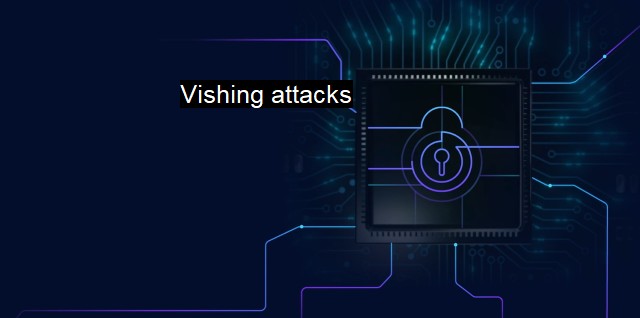What are Vishing attacks?
The Growing Threat of Vishing Attacks and Their Devastating Effects on Personal and Business Security
Vishing attacks, or voice phishing, is a specific kind of social-engineering attack characterized by fraudsters manipulating victims over phone calls, with the aim to steal personal or financial details for illicit reasons. An acronym derived from 'voice' and 'phishing', Vishing significantly marks itself under the umbrella of cybersecurity threats that security engineers endeavor to prevent.In vishing, characters primarily portray an authority figure or engage in narratives compelling the victim to share sensitive data, often impersonating bank officers or other credible roles. The impersonation credibility is a compelling factor in successful Vishing attacks. Built on trust, these attacks exploit the victim's perennial belief in reputed institutions to extricate confidential information, thereby breaking through traditional antivirus scanners and firewall defenses effortlessly.
Vishing's highly manipulative nature sets it apart from other phishing techniques. Phone calls add a personal touch, making the deception seem more plausible. By exploiting human psychology and proclivity towards trust, vishers capitalize on creating a sense of panic in victims, urgently pushing victims to share information without second thoughts. All this is accomplished while lounging behind the safety of pseudo-anonymity that crisis situations furnish, giving vishers an additional advantage.
Counterfeiting caller IDs commonly aid Vishing attacks. By using Voice over Internet Protocol (VoIP) services and specially programmed software, vishers can falsely present any number on the victim’s caller ID. This ploy not only fortifies the deception's believability but provides cyber attackers immense power to exploit their victims. Antivirus systems, unable to identify or prevent such occurrences, render the consumer potentially vulnerable.
One of the classic examples of successful Vishing attacks is the IRS telephone scam. In these cases, perpetrators mimic an IRS agent informing victims about phantom tax liabilities they need to pay immediately to avoid legal consequences. Victims are then persuaded to disclose their financial details or wire the money instantaneously. As common as these types of attacks are, they can bypass even the most secured and updated antivirus systems.
The elderly represent a privileged target demographic due to cognitive degeneration associated with age and relative unfamiliarity with modern technologies, making Vishing a formidable risk. Unfortunately, the conventional antivirus solutions do not yet possess malice detection capability over the telephone device. Therefore, the favored endorsement is user empowerment through knowledge of such exploits and acting cautiously.
Awareness campaigns accentuating security threats and literating users about Vishing scams form potent antidotes currently available. "... If it sounds suspicious, hang up" - a communication widely pronounced in the cybersecurity communities replace the expensive and futile race to create the latest antivirus software. Instigating retreat at the hint of suspicion demonstrates the first to protect oneself.
Further, creating multi-step verifications complement proactive personal cybersecurity measures. By incorporating these practices, an alarm goes off in case of any suspicious activities in their account. Although these methods do not guarantee full safety from a vishing attack, they can massively curb its damage- thus marking it as a valuable approach.
Vishing is a form of a cyber-attack wherein perpetrators exploit human fault-lines to access personal information over phone calls. Traditional antivirus solutions and firewalls lay ineffective in the face of such threats. Consequently, emphasis is encouraged in public awareness measures, reinforcing the approach of self-defense. Vishing, therefore, exposes the social facets of cybersecurity, extending beyond just computer systems and internet databases into the realm of human interaction and psychology.

Vishing attacks FAQs
What is a vishing attack?
A vishing attack is a type of cyber attack where hackers use phone calls or voicemail messages to trick people into giving away sensitive information. The word "vishing" is a combination of "voice" and "phishing," which refers to a similar type of attack that is carried out through email.How do vishing attacks work?
In a vishing attack, hackers often use a technique known as "caller ID spoofing" to make it look like they are calling from a legitimate source, such as a bank or a government agency. They then use social engineering tactics to convince the victim to reveal personal information, such as account numbers or passwords.How can I protect myself from vishing attacks?
One of the best ways to protect yourself from vishing attacks is to be wary of any unsolicited calls requesting personal information. If you receive a call like this, hang up and call the organization directly to verify the request. You should also consider installing anti-virus software on your devices to help protect against other types of cyber attacks.What should I do if I think I've been targeted by a vishing attack?
If you think you've fallen victim to a vishing attack, you should immediately contact your bank or financial institution to report the incident and change any affected account passwords. You should also report the incident to the appropriate authorities, such as the Federal Trade Commission, and consider taking additional steps to protect your identity, such as placing a fraud alert on your credit report.| | A | | | B | | | C | | | D | | | E | | | F | | | G | | | H | | | I | | | J | | | K | | | L | | | M | |
| | N | | | O | | | P | | | Q | | | R | | | S | | | T | | | U | | | V | | | W | | | X | | | Y | | | Z | |
| | 1 | | | 2 | | | 3 | | | 4 | | | 7 | | | 8 | | |||||||